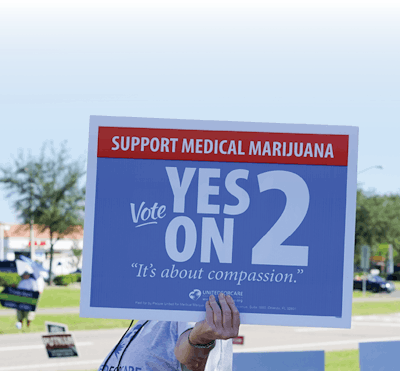
Floridians need medical marijuana. Thus, Floridians need business professionals, entrepreneurs and compassionate people to contribute to the costly fight that has ensued over this very important issue.
The 2014 version of Amendment 2 (same amendment number, different year, slightly different language) received the majority of the vote (however, Florida requires 60-percent support to pass a Constitutional Amendment) ; the campaign to pass a comprehensive medical marijuana law was defeated by 2 percent.
Money persuaded the senior population in the last few days of the campaign to vote “no.” More money was spent on Florida's fight over medical marijuana than all other states’ medical marijuana issues combined — ever.
It is two years later, and people are still suffering, so we're back at it. Again, we are named Amendment 2.
This law will help hundreds of thousands of the very ill residents in Florida. This law, with a doctor’s recommendation, will give relief to those suffering from ALS, PTSD, Crohn's, Parkinson's, HIV/AIDS, epilepsy, cancer, glaucoma and multiple sclerosis.
“More money was spent on Florida's fight over medical marijuana than all other states’ medical marijuana issues combined — ever.”
Florida is poised to be a billion-dollar industry — the second largest in the nation.
Those who want to make money know investment is key. Those who want to have a successful campaign know TV commercials are key. At United for Care, we raised and spent $7.5 million during the 2014 cycle. This was spent approximately 50/50 between the petition phase and the campaign phase. Unlike United for Care, which spent half its money just making the ballot, the “Vote No on 2” campaign was able to put nearly all its money into negative TV ads. This allowed the “Vote No on 2” campaign to have more visibility than the “Yes on 2” campaign during the crucial final 45 days before the election.
If business is going to boom, we need more funds for commercials during this election cycle. We don’t need to outspend our opposition 5 to 1 to win. We don’t even need to match them dollar for dollar. We need about $3 million to gain the kind of TV time that we think is going to be the difference between winning and losing.
Florida is going to need testing labs, security, retailers of soils, nutrients and lights, packaging facilities, cultivation sites and, of course, medical marijuana dispensaries, to name just a few.

Right now, we have a very limited medical marijuana program; it’s been dubbed “Charlotte’s Web Law.” It’s a low-THC, non-smoking medical marijuana law aimed at helping children with seizure disorders. Since passing in 2014, it has been modified to allow use by adults and those suffering from cancer.
Like the laws in some other states, this law is not only limited in the number of patients it will help, but also in the possibilities for business. The current law allowed for five license holders. There are now six because of a challenge that was won by one of the original 28 applicants. These six license holders are vertically integrated businesses. Thus, they control growing, extraction and sale of medical marijuana. This is essentially a state sanctioned oligopoly and not the open market system we want.
The amendment language does not have provisions for how many licenses will be awarded or what that system will look like, but our sister organization, Florida for Care, will go to the capital and lobby for a robust, well-regulated, free-market commercial enterprise when Amendment 2 is passed. Florida for Care will take the will of United for Care’s investors to the capital to ensure a lucrative, fair system is created.
Having a robust market ensures patients will have reasonable access, which is our No. 1 priority. We’ve already put a member-voting system in place. Everything from application fees, solvency requirements, how heavy retail experience should weigh in an application, etc., will be voted on by members.
Like any other competitive market, you need to have a more-than-mediocre business plan to be successful — especially here in the Sunshine State. I’m not telling entrepreneurs to throw their money at United for Care and we’ll make a miracle happen for their C level business with no experience. What I’m saying is, if you put in funds to help Amendment 2 pass, you can also put in your opinion to help shape the regulations for what is going to be the second-largest marijuana market in our country, and that alone will give any business the best lift-off possible.














